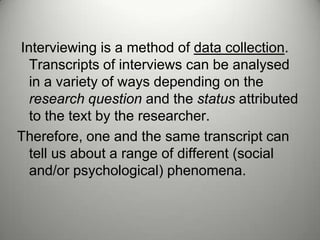
Interviewing skills
- 1. Interviewing is a method of data collection. Transcripts of interviews can be analysed in a variety of ways depending on the research question and the status attributed to the text by the researcher. Therefore, one and the same transcript can tell us about a range of different (social and/or psychological) phenomena.
- 2. The status of the „text‟ Is determined by what we want the text to tell us something about. Eg. an account could tell us something about the nature of the phenomenon of interest, about the (psychology of the) person who is providing the account, or about the cultural resources and meanings that are available in relation to the topic.
- 3. The research question The research question identifies what it is that we want to find out whilst the interview agenda contains questions which (we hope) will generate the kind of data which will help us answer the research question.
- 4. Epistemological position The research question and the status given to the text together imply (and are underpinned by) an epistemological position. Possible positions include realist, phenomenological and social constructionist positions.
- 5. Positions Realism (naïve/direct or critical) Phenomenology (descriptive or interpretative) Social constructionism (moderate or radical)
- 6. The formulation of the research question, the interview agenda, criteria for recruiting participants, style of interviewing, choice of transcription notation, and method of analysis are all directly informed by the epistemological position adopted by the researcher.
- 7. Research questions A realist question: “How do people make decision about whether or not to donate a kidney ?” A phenomenological question: “What is it like to donate a kidney ?” A social constructionist question: “How is kidney donation constructed ?”
- 8. However… “The interview is a specific form of conversation where knowledge is produced through the interaction between an interviewer and an interviewee” (Kvale, 2007: xvii). This means that there are some generic guidelines for conducting productive and ethical interviews.
- 9. Descriptive questions: “What happened ?” eg. life histories, anecdotes, activities, events Structural questions: “Why ?” “How ?” organisation of understanding; categories of meaning, assumptions, and frameworks for making sense of the world
- 10. Contrast questions: “Worst/best ?” “Difference between ?” criteria for evaluation, comparisons Evaluative questions: “Like/dislike ?” feelings, responses (eg. approval/disapproval; preferences)
- 11. Guidelines for semi-structured interviewing • Adopt an attitude of non-judgmental curiosity • Ensure that the interviewee feels safe and comfortable • Use the interviewee‟s own terms • Aim for conceptual equivalence (rather than lexical comparability) • Restate the interviewee‟s comments and incorporate them into new questions
- 12. • Express ignorance • Request examples • Move from the public to the personal • Appraise the interview as a communicative event • Appraise the effect of the interviewer on the interviewee
- 13. Ethics • Obtain informed consent • Ensure confidentiality • Keep data safe and secure • Do not share data without permission • Ensure interviewee‟s comfort and safety • Monitor the interviewee‟s response to being interviewed • Discontinue the interview if necessary
- 14. • Ask permission to record the interview • Invite interviewee to ask questions at the end • Provide opportunity for debriefing • Refer to relevant sources of support if necessary
